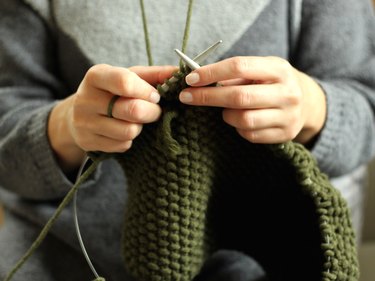
Feeling more anxious, depressed or stressed lately? The answer, in part, may have something to do with your daily dose of screen time. Yup, those hours you spend scrolling through your social media feeds may be taking a toll on your mental health.
Here, experts explain the connection between social media exposure and emotional wellbeing, break down the signs that your habit is becoming unhealthy and share strategies to manage your media consumption.
Video of the Day
Video of the Day
Get tips on how to stay healthy, safe and sane during the novel coronavirus pandemic.
A robust body of research shows a correlation between social media use and increased anxiety and depression. And, with the current state of things — i.e. stressful news of COVID-19, racial injustice and political instability likely filling your feed — your mental health may be at an even greater risk.
In fact, an April 2020 study in PLOS One found that frequent social media usage during the novel coronavirus pandemic correlated with higher levels of anxiety among users. These findings align with previous research that has identified a link between exposure to public crises and the prevalence of mental health issues, the authors note.
"Certain people like government leaders and frontline responders have an ongoing need to stay current on up-to-the-moment news developments, but most ordinary citizens don't need continual updating."
With the constant bombardment of worrying news about world events, it's no wonder that social media can make people feel anxious, fearful and helpless, Tra Hoang, LMSW, a New York City-based therapist in private practice, tells LIVESTRONG.com.
From COVID-19 to police brutality, we are exposed to a growing gamut of negativity that may trigger an expanse of emotions, including feelings of powerlessness. Many people "feel as though they are in the passenger seat with no control over how to make things better for themselves and others," Hoang says.
This is especially harrowing for people struggling with generalized anxiety disorder, who are already prone to worry, and those who have a particularly difficult time coping with uncertainty, says David Carbonell, PhD, a clinical psychologist and author of The Worry Trick: How Your Brain Tricks You into Expecting the Worst and What You Can Do About It.
These individuals will "have a lot of trouble with news and social media because little about the coronavirus and other current difficulties is certain," Carbonell explains.
Related Reading
Often, you may be totally unaware that your social media diet is causing you distress. But if you pay attention, you'll be able to pinpoint signs that your excessive scrolling is sabotaging your mood.
1. Your Stomach Churns
First and foremost, focus on how your body reacts when engaging with social media.
Notice any "physical symptoms that arise such as restlessness, stomach churns, sped-up heart rate or muscle tension," Hoang says, adding that some people also experience a constant state of edginess or grogginess.
Other physical symptoms include diminished quantity or quality of sleep and weight gain, Carbonell adds.
2. You Catastrophize — or Feel Nothing
If you think to yourself "This will only get worse and worse" or other catastrophizing or intrusive thoughts as you scroll, social media is probably negatively affecting your mental health, Hoang says.
But something called experiential avoidance can be a telltale sign, too. This happens when someone attempts to avoid negative thoughts and emotions, but doing so may harm you in the long run. "This avoidance might prevent the person from attending to important valuable actions that they could be taking" to improve their situation, Hoang says.
3. You Turn to Alcohol or Food
Keep an eye on behavioral changes such as an uptick in overeating or alcohol and recreational drug use or a significant decrease in "time devoted to pleasant and productive activities" in response to social media, Carbonell says. This type of coping is likely a sign your scrolling is doing more harm than good.
How to Set Healthy Limits

Though a complete social media cleanse may be unrealistic, creating boundaries to curb your consumption can be helpful. Here are three things you can try to keep your social media use in check.
1. Set a Schedule
While it's important to stay informed of current events, you shouldn't check your feed constantly.
"Certain people like government leaders and frontline responders have an ongoing need to stay current on up-to-the-moment news developments, but most ordinary citizens don't need continual updating," Carbonell says.
To manage your social media use, set a time limit, say, 30 minutes per day, says Hoang, who encourages using a timer to keep you in line. She also recommends steering clear of social media first thing in the morning or just before bedtime. This way your news feed doesn't set the tone for your day or sabotage your sleep at night.
2. Redirect Your Attention
When scrolling through social media, it's important to notice your emotions and make space for them. "It's OK to feel sad about what's going on, but be mindful about where your feelings and thoughts take you," Hoang says.
Instead of letting your thoughts spiral out of control, acknowledge how you feel, then gently redirect your focus to something more positive. Hoang suggests "engaging in things that give you positive feelings and a sense of accomplishment," from taking a walk to cleaning your apartment or starting a creative project.
Note that this is different than distracting yourself. "Distraction itself is not a particularly helpful strategy, because our efforts to distract ourselves often end up reminding us of what we wanted to distract from," Carbonell explains. Conversely, channeling your energy into healthier activities allows you to involve both body and mind in tasks that are much more rewarding, he says.
3. Soothe With Self-Care
Now that you've placed a limit on your daily social media consumption, what are you going to do with all that extra time? Use the minutes or hours (we're not judging) you get back "for activities that stimulate both your body and mind," Carbonell says.
Exercising, connecting with loved ones, pursuing a hobby, helping others or practicing meditation and yoga are all healthy alternatives to social media that reduce stress, Carbonell says.
But self-care can simply come in the form of showing empathy and compassion to yourself. "This means being mindful and accepting negative feelings as well as positive ones as we recognize our struggles and respond with kindness to ourselves," Hoang says.
Concerned About COVID-19?
Read more stories to help you navigate the novel coronavirus pandemic:
Was this article helpful?
150 Characters Max
0/150
Thank you for sharing!
Thank you for your feedback!
Is this an emergency? If you are experiencing serious medical symptoms, please see the National Library of Medicine’s list of signs you need emergency medical attention or call 911.